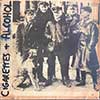In England, they march and they riot. Race riots and nasty National Front gangs were pitted against punks and Rasta’s. Here, in Oz, our most famous riot was the at The Star Hotel in Newcastle and that was because the beer was being cut off after trading hours by the police.
There was a combination of reasons for the differences. In Australia, between 1976 till 1980, the music scene was mostly Pub Rock. Anthony O Grady (then editor of Rock Australian Magazine) says that when you look at numbers of people attending live sport now, there were far more folk out seeing live music on Friday and Saturday nights. Fair call. It was really was a working class movement. A world of drinking piss by bucketloads and then seeing the Angels, Cold Chisel or The Tatts.
Then there was Radio Birdman and the post-Birdman bands that were directly inspired by the Stooges and MC5, an inner Sydney phenomenon and not as mainstream as British punk was locally. In reality, most punk fans in Australia came from leafy suburbs as far afield as The Hills District and affluent Mosman. Punk rock was, at times, elitist and tribal, and a rebellion against pub rock and suburbia. And there were lots of drugs.
In the Australia of the late ‘70s I can really name about 10 pure punk singles (and that would NOT include Stranded which was proto punk.) It was the post punk era when Australian bands appeared to fire up, it all became a bit more mainstream. For example, look at the commercial success of The Models, Machinations and Hunters and Collectors. When you listen to the remarkable compilations put out by Bruce Griffin on his Aberrant label (”Not So Humdrum“ and “Why March When You Can Riot”) it appears that not one Australian “punk” band ever got signed to a major label. There were very few indie labels that were like-minded and most punk bands never got past the demos stage. It was expensive to self-release a record in those days.
That is why “Cigarettes and Alcohol” is a remarkable single, delivered by a benchmark Brisbane band in The Leftovers. A band that formed late in 1976 - the same year Stiff Little Fingers, Buzzcocks and The Clash came into being. This puts them in some sort of historical context. They were similar to those bands but this single is nastier, more brutal and played with more urgency.
The A side was recorded in 1977. It times in at less than two minutes. The song explodes with the toms of Ed Wreckage and the smashing of barre chords. Simple and primal, with the guitars raw and narky. The guitars are the basis to driving the song with a short and sharp lead cutting in from Jim Shorebridge. Warren Lamond’s edgy, working class sneer declares: “I used to be my mother’s favorite son” As he spits out the lyrics. It is taking to another level of intensity a song like Stiff Little Fingers’ “Suspect Device”. The Sex Pistols sound over produced compared to this. As a recording, “Cigarettes and Alcohol” is completely raw and urgent.
Flip it over there two more short two minute jabs; stabs and knockouts. “I Only Panic When There Is Nothing To Do” rolls on, laced with feedback. This was recorded six months after the A side. It’s a blaze of barre chords and again Ed Wreckage provides a solid back beat. The lead breaks have disappeared; it is straight forward hard-edged punk. “No Complaints” finishes side two and Warren Lamond again sneers through its two minutes. “I never complain when your radio plays.”
Yes, this record has a historical significance. That aside, I get the feeling if the cops had not tried to fuck everything up and close their gigs, there would have been heaps of fun to be had at Leftovers gigs. Think: high energy and a damned full-on mosh pit.
Could have this band only have come from Brisbane at that time? I am unsure. The Saints had surfaced in earnest the year previous and Ed Kuepper maintains there was nothing really that political about The Saints: they were stranded musically. I tend to think The Leftovers are the band that represents the rebellion against the hillbilly, Neocon/Fascist world of Brisbane at the time: brutal times where people were beaten sense less by thug cops and radio stations were raided and closed. More importantly gigs, were closed and those who went were intimidated.
Boutique Brisbane label LCMR via the Phase 4 shop has done a brilliant job with packaging with every record numbered and all the detail: A re-release done for love and dedication. Its second pressing has now sold-out. Maybe Discogs or eBay will help you. 





 Australian punk was never the widespread movement as it was in England, or parts of Europe, where for a time, it was mainstream. Unlike Australia. The Sex Pistols(unofficially) went to number-one with "God Save the Queen". The Clash , The Buzzcocks, The Jam and Stranglers consistently charted,alongside Elton John and Cliff Richard.
Australian punk was never the widespread movement as it was in England, or parts of Europe, where for a time, it was mainstream. Unlike Australia. The Sex Pistols(unofficially) went to number-one with "God Save the Queen". The Clash , The Buzzcocks, The Jam and Stranglers consistently charted,alongside Elton John and Cliff Richard.